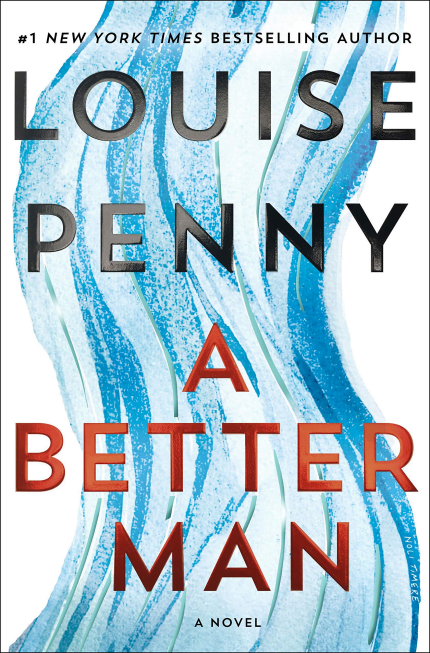A Better Man (Chief Inspector Armand Gamache #15), by Louise Penny

My rating: 5 of 5 stars
Two years ago, I somehow came across “Still Life”, the first in a series about Chief Inspector Armand Gamache of the Sûreté du Quebec, Canada. It was a good book, no doubt, and I was quick to catch up with the series which I greatly enjoyed.
What I expected to be a standard police procedural turned out to be so much more. Gamache isn’t the young, enthusiastic investigator but a man in his fifties who has experienced a lot and instead of becoming disillusioned, embittered or hopeless as one might expect, he grows.
“Things are strongest where they’re broken.” is how Gamache puts it and how he lives – and he himself has been broken a lot of times. He’s not the “Gentleman police officer” that George’s Lynley is (or used to be). He’s not Rankin’s cynical Inspector Rebus.
Armand Gamache is a literary unicum.
In this fifteenth novel of the series, Gamache investigates the disappearance of a young woman who is beaten by her husband. She is soon found dead and so is her murderer. If he can be convicted, though, is not quite as certain…
As always, Gamache’s home, the small village “Three Pines”, and its inhabitants play a role (albeit less prominently than in some of the other books) and we get treated to all the familiar characters like Ruth, the semi-insane poet, Clara, the artist, and, of course, Jean-Guy Beauvoir and Isabelle Lacoste.
The relationships between the characters are another of the major highlights of this series: The closely-knit and yet open, welcoming and open-minded community of “Three Pines” is the fictious place we would love our kids to grow up in.
These books live from the relationships so lovingly depicted and the almost mythical quality of “Three Pines”.
As with every one of her Gamache novels, Penny has a fundamental topic which might not continually take a centre place but which will surface throughout the novel. In this case it’s vigilantism – how do the central characters deal with it themselves when most seriously tempted; when all it would take is looking away at the right moment…
“It was all Jean-Guy Beauvoir could do not to turn around. March back to […]. Tell Armand and Reine-Marie and Billy to look away while he forced […] to a kneeling position, took out his gun. Placed it at the base of the monster’s skull. And fired.”
And – how would we deal with it? Would we give in to the temptation? I’m going to admit it: I for one was sympathising with Beauvoir at that (rather early!) point in the story. I hope I’d do as he does…
Would we be able to face the consequences of our deeds?
““Consequences,” said Gamache. “We must always consider the consequences of our actions. Or inaction. It won’t necessarily change what we do, but we need to be aware of the effect.”
Ultimately, though, both Gamache and Beauvoir disregard exactly that advice and that’s part of what so greatly appeals to me about those two men: When they feel they have to act, they’re just going to do it – no matter the consequences because it’s the right thing to do:
“Homer plowed right through them, running straight into the Bella Bella. Wading in. Breaking through the thin ice at the shore, he fought his way forward. To get to his little girl.
Gamache and Beauvoir plunged in after him.”
Even if that means plunging into a flooding river – and Penny pulls that off effortlessly. She has given each character her books so much personality that we never – not for a second – doubt they would do this. It’s another one of the immense strengths of Penny’s story-telling – she is a master of characterisation.
As similar both Gamache and Beauvoir are, they are different kinds of investigators which is another highly interesting aspect of the Gamache novels:
“While Jean-Guy Beauvoir explored the tangible, what could be touched, Armand Gamache explored what was felt. He went into that chaotic territory. Hunting. Searching. Tracking. Immersing himself in emotions until he found one so rancid it led to a killer.
Beauvoir stopped at the door. Gamache went through it.”
All this may sound intimidating if you’re just in it to read a good mystery but do not despair because while there’s lots of serious wisdom and kindness to be found in these books, they never take themselves too seriously and there’s always a good portion of humour involved:
“Isabelle. Jean-Guy. Armand. Three colleagues. Three friends. A trinity. Sturdy. Eternal. Together. “Three Pines,” she said. “Three Stooges,” said Ruth as she walked by and entered the bistro.”
As usual, there are very few things not to like about a Gamache novel but there are two minor issues in this one: First of all, there’s a huge flooding. Basically, the entire province of Quebec is in a state of emergency and we get to read quite a bit about it in the first half of the book. This entire part of the story is pretty much completely neglected in the second half. It’s not a big deal but it’s a loose end that could easily have been avoided.
A little more annoying were the weird and superfluous injections of Twitter messages at the beginning of a few chapters. They didn’t really add to the story and they were an unwelcome distraction. I don’t get why some authors these days seem to believe they cannot write a good modern book without directly adding social media parts. Especially when they obviously don’t quite grasp how said social media work (in a technological sense).
Nevertheless, these are really minor issues that simply don’t matter considering Louise Penny’s achievement by writing yet another, the fifteenth (!), absolutely fabulous book.
View all my reviews